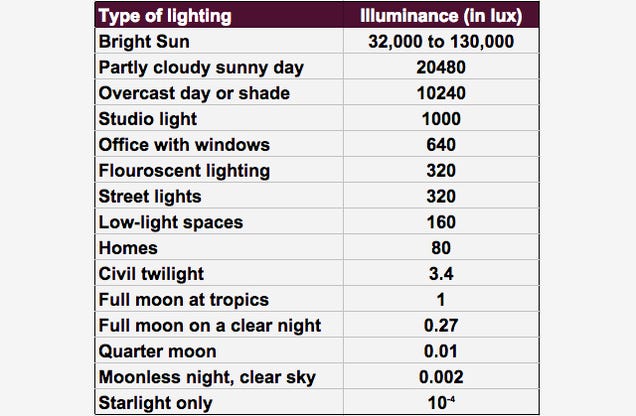| Online: | |
| Visits: | |
| Stories: |

| Story Views | |
| Now: | |
| Last Hour: | |
| Last 24 Hours: | |
| Total: | |
Why We Need To Sleep In Total Darkness

The modern bedroom is full of lights, from glowing computer monitors and clock radios to any number of blinking and glimmering electronic devices. Trouble is, chronic exposure to light at night leads to a host of health problems.
To understand why chronic exposure to light at night is so bad, we need to consider human evolution. Prior to the end of the stone age, humans were exposed to two different kinds of natural light responsible for regulating circadian rhythmicity. During the day we had the sun, while at night we had the moon and the stars, and perhaps the light from campfires. The binary day/night pattern was unrelenting, and our biological programming followed suit.
Today, we have artificial lighting at night (LAN), and it’s a different case altogether. Indoor lighting is considerably less powerful than sunlight, but many orders of magnitude greater than star and moonlight. Check out this chart to see what I mean:

Keep in mind that this is a logarithmic scale, so the difference between sunlight and moonlight is considerable — a difference that influences a series of critical biochemical cascades tied to light periodicity, including the production of cortisol and melatonin levels.
Light is a Drug
Melatonin suppression is key to understanding much of why LAN is so crappy for us. This workhorse biochemical is produced by the brain’s pineal gland at night — when it’s dark — to regulate our sleep-wake cycle. It lowers blood pressure, glucose levels, and body temperature — key physiological responses responsible for restful sleep. As neurologist George Brainard puts it, “Light works as if it’s a drug, except it’s not a drug at all.”
The part of your brain that controls your biological clock is the Suprachiasmatic Nucleus (SCN), a group of cells in the hypothalamus. These cells respond to light and dark signals. The optic nerves in our eyes senses light and transmits a signal to the SCN telling the brain that it’s time to wake up. It also kickstarts other processes, like raising body temperature and producing hormones like cortisol. Our cortisol levels are relatively low at night, allowing us to sleep, and higher during the day, allowing for the stabilization of energy levels and the modulation of immune function.
But LAN unnaturally elevates cortisol levels at night, which disrupts sleep and introduces a host of problems relating to body-fat levels, insulin resistance, and systemic inflammation. It also contributes to sleep debt and a disruption the neuroregulation of appetite.
Be AWARE truthisscary.com
Source: http://truthisscary.com/2015/02/why-we-need-to-sleep-in-total-darkness/





YEP
Awsome work !
Evolution? Move along. Nothing to see here.